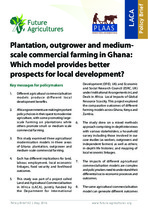| dc.contributor.author | Yaro, Joseph Awetori | |
| dc.contributor.author | Teye, Joseph Kofi | |
| dc.contributor.author | Torvikey, Gertrude Dzifa | |
| dc.date.accessioned | 2019-03-08T11:31:26Z | |
| dc.date.available | 2019-03-08T11:31:26Z | |
| dc.date.issued | 2016 | |
| dc.identifier.citation | Yaro, J. A. et al, 2016. Plantation, outgrower and medium- scale commercial farming in Ghana: Which model provides better prospects for local development, Cape Town: Institute for Poverty Land and Agrarian Studies (PLAAS) | en_US |
| dc.identifier.uri | http://hdl.handle.net/10566/4441 | |
| dc.description.abstract | There has been a sustained push for agricultural commercialisation in developing countries. In Africa, this has been pursued in different ways over time. During the colonial era, most governments believed that plantations were the best model for bringing about rapid modernisation of agriculture. However, in Ghana, the plantation model gained more prominence during the post-independence era when state-owned farms were established in all agro-ecological zones. State authorities argued at the time that plantations have merits transcending economies of scale: they are technology hubs for innovation diffusion, and bring marketing benefits, greater productivity and higher output (Collier and Dercon 2009; Epale 1985). | en_US |
| dc.language.iso | en | en_US |
| dc.publisher | Institute for Poverty Land and Agrarian Studies (PLAAS) | en_US |
| dc.relation.ispartofseries | FAC Policy Brief;82 | |
| dc.subject | Plantation | en_US |
| dc.subject | Outgrower | en_US |
| dc.subject | Commercial farming | en_US |
| dc.subject | Ghana | en_US |
| dc.title | Plantation, outgrower and medium- scale commercial farming in Ghana: Which model provides better prospects for local development | en_US |
| dc.type | Other | en_US |

